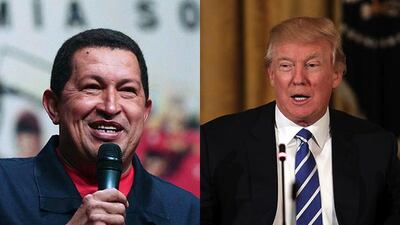Populism has almost never been a respectable word, but after Nicolas Maduro’s attempt to take over Venezuela’s legislature’s powers last month it has been freighted with particularly authoritarian baggage. Populists may be democratically elected, as Mr Maduro and his predecessor Hugo Chavez were, we are told; but the slide towards autocracy is inevitable, as unbridled majoritarianism undermines the independence of all institutions that stand in its way.
Parallels are now being drawn between Mr Chavez and the new president of the United States, Donald Trump. Be careful of the slippery slope on whose edge the US teeters, say the doom mongers, seeming to predict – surely somewhat implausibly – that if he isn’t kept in check Mr Trump could easily morph into a Latin American-style caudillo.
One such prediction quoted Cas Mudde, a Dutch political scientist, who has written that “populism is an illiberal democratic response to undemocratic liberalism”. That is worth considering. While Mr Mudde is one of many who worry about populism’s majoritarian trajectory, the point is that it is an expression and assertion of democracy. And that, surely, is far more important than whether it is liberal or not. The latter is a matter of personal political leaning; democracy, on the other hand, is in many countries the bedrock, the agreed system by which such opinions can be aired. In those countries, any democratic decision is necessarily always superior to an undemocratic one.
So populism is entirely justified if it is a response to what Mr Mudde calls “undemocratic liberalism” or to the many countries in which large segments – majorities, even – have felt excluded by the established political system for too long. Brexit was an example. In the last British general election there was not a single major political party calling for the United Kingdom to leave the European Union. And yet that was what the people voted for when given the choice. If populism is merely letting the voters have their say, isn’t that the essence of democracy?
In the US, too, it seems very likely that the presidential election demonstrated that there is a populist majority railing against the status quo and a two-party system whose elites seem determined to frustrate the desires of ordinary people. Admittedly, Mr Trump did not win the popular vote. But if you add to his supporters the enthusiastic crowds who propelled Bernie Sanders so close to the Democratic nomination, you may well have over half the voters.
Mr Trump and Mr Sanders are different kinds of populists, to be sure. But they draw on the same well of disaffection, and they share – or shared in their campaign rhetoric, at least – the aim of helping the millions of Americans who have been left behind and who need the government to act on their behalf. Not by building walls to keep out Mexicans, of course, but by starting massive infrastructure projects that will provide jobs for hundreds of thousands, and by protecting, not removing, services and safeguards for low-income groups.
Their followers are divided by party, however, and just as they faced a Democratic leadership that did not appear to represent their interests in Hillary Clinton, they face a Republican faction outright opposed to their interests in the small government conservatives of the Freedom Caucus in the House of Representatives. It was this caucus that derailed the recent Republican health care bill, earning members a declaration of war from Mr Trump.
If he has now decided that he cannot govern with them, and will not be dictated to by their agenda – which is nothing like his distinctly big government agenda – and therefore seeks to form a congressional majority with populist Democrats, that would be a truly hopeful outcome. Even Mr Sanders has acknowledged that in the past.
A two-party duopoly in which each prefers to privilege its own narrow interests over the good of the majority, however, could doom this optimistic scenario. The Democratic leadership, copying the Republicans in the past, may be unwilling to cooperate with the president even when they agree with him.
We see too many examples of that around the world. In Malaysia, the Barisan Nasional government’s 1Malaysia programme was probably the greatest attempt to ameliorate race relations in decades. Yet the opposition scorned it, despite it coming close to the vision they had long advocated, because they couldn’t bear to give the Barisan credit for anything.
This kind of obstructionism and unwillingness to come together to serve the best interests of the people – and provide them with options they clearly desire – only fuels the rise of populism, wherever it occurs.
Yes, there are forms of populism that do appeal to base and prejudiced sentiment, such as the frequently hyped-up fear of immigration. But one also has to ask why that fear is so widespread. And the answer lies, at least partly, with the failure of mainstream politicians to listen to the people or even to recognise the legitimacy of their grievances, still less address them.
When the people finally manage to have their voices heard, then, it cannot be through parties that have ignored them. It has to be through outsiders from the left and right who denounce the system for failing to represent its people. These are the populists surging around the world, and before you condemn them as would-be autocrats, remember this: they wouldn’t be there at all if democracies had been doing their jobs properly. They may just provide the sharp kick necessary to remind democracies they are there to serve the people, not the elites. For in a democracy, the people are never wrong.
Sholto Byrnes is a senior fellow at the Institute of Strategic and International Studies, Malaysia


